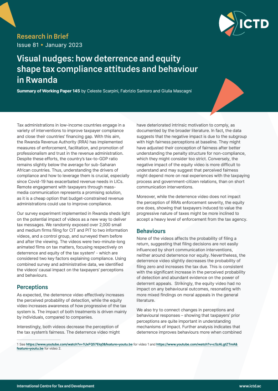Research in Brief 81
Tax administrations in low-income countries engage in a variety of interventions to improve taxpayer compliance and close their countries’ financing gap. With this aim, the Rwanda Revenue Authority (RRA) has implemented measures of enforcement, facilitation, and promotion of professionalism and trust in the revenue administration. Despite these efforts, the country’s tax-to-GDP ratio remains slightly below the average for sub-Saharan African countries. Thus, understanding the drivers of compliance and how to leverage them is crucial, especially since Covid-19 has exacerbated revenue needs in LICs. Remote engagement with taxpayers through mass media communication represents a promising solution, as it is a cheap option that budget-constrained revenue administrations could use to improve compliance. Our survey experiment implemented in Rwanda sheds light on the potential impact of videos as a new way to deliver tax messages. We randomly exposed over 2,000 small and medium firms filing for CIT and PIT to two information videos, and a control group, and surveyed them before and after the viewing. The videos were two-minute-long animated films on tax matters, focusing respectively on deterrence and equity of the tax system1 – which are considered two key factors explaining compliance. Using combined survey and administrative data, we identified the videos’ causal impact on the taxpayers’ perceptions and behaviours. Summary of Working Paper 145 by Celeste Scarpini, Fabrizio Santoro and Giulia Mascagni.
